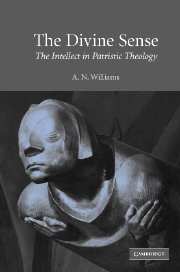Book contents
Chapter 3 - Cappadocian theology: Nazianzen and Nyssen
Published online by Cambridge University Press: 22 September 2009
Summary
With the Cappadocians, we re-enter the world of Alexandrian theology, for they are in many ways most fully Origen's heirs. Although we will see many of the same themes that appeared in the theology of the early Alexandrians, the thought has been refined, Origen's skittishness about the body being less in evidence, and new theological themes – such as infinity – doing greater systematic work. The lines of continuity nevertheless appear far more clearly than does any evidence of breakage, and this fact testifies not only to the constancy of our theme in patristic theology but also to the relatively small impact of contemporary controversies on its overall shape: despite the very different concerns of one figure's arguing against gnosticism and another against Arianism or Eunomianism, within their theological systems the significance of the intellect remains largely the same.
More surprising than the low impact of these latter controversies is the slight effect of the Apollinarian, whose relevance to matters touching the intellect is more immediate. There are several factors that may account for the relative lack of energy around this issue in the thought of Nazianzen and Nyssen. The first is that although both assert a rational soul in Christ for the most part neither is directly disputing with Apollinarius and they accordingly assume a human mind in Christ rather than argue for it vigorously.
- Type
- Chapter
- Information
- The Divine SenseThe Intellect in Patristic Theology, pp. 86 - 142Publisher: Cambridge University PressPrint publication year: 2007

